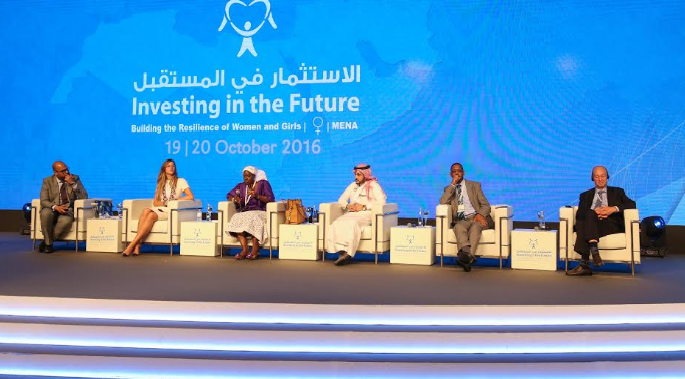
The first session discussed the best ways to build the capacities of women and girls around the world
The first of the four major sessions at the second ‘Investing in the Future’ (IIFMENA) conference discussed the best ways of building the resilience of women and girls in the Arab region through education and employment. The conference opened today (Wednesday) at the Al Jawaher Reception and Convention Centre in Sharjah.
The two-day global forum is organised by The Big Heart Foundation, a Sharjah-based international humanitarian body dedicated to aiding vulnerable people worldwide, in collaboration with the United Nations Entity for Gender Equality and the Empowerment of Women (UN Women), and is being held under the patronage of His Highness Sheikh Dr. Sultan Bin Mohammed Al Qasimi, Member of the Supreme Council and Ruler of Sharjah along with his wife, Her Highness Sheikha Jawaher Bint Mohammed Al Qasimi, Chairperson of The Big Heart Foundation and Chairperson of the NAMA Women Advancement Establishment.
Giving the opening address at the panel discussion was Priti Patel, United Kingdom’s Secretary of State for International Development. Patel expounded on her personal development that enabled her to attain high office as a woman, and highlighted how the UK is working to empower women across the world.
“My own personal journey was made possible by those who went before me and blazed a trail for women. They have made anything and everything possible. My department has a huge footprint globally and in the last five years alone, UK aid has helped five million girls around the world get into secondary school and further their education. It has also helped 36 million women access financial aid,” she said.
Speaking of her role in encouraging women to become angel investors, Elissa Freiha, co-founder of Womena, said; “We don’t look just at investment for women, we encourage investment by women. We train women to invest in technology start-ups. We support them by providing them with education then empower them by facilitating the investment process,” she said.
Calling for immediate action in the empowerment process, Dr. Helmut Kutin, International Honorary President of SOS Children’s Villages, an independent, non-governmental international development organisation, said; “Instead of advocating ‘Investing in the Future,’ we should be saying ‘Invest in the present.’ In my travels throughout 134 countries as part of my role, one thing preoccupies me: we have the knowledge, we have the laws, we have the declarations, but we still need the implementation. We need to put our hands together and act now,” he said.
Among the issues raised by Naser Haghamed, CEO of Islamic Relief Worldwide, during his participation in the discussion was that some seemingly well-intentioned investment initiatives for women’s empowerment were still subject to male oversight. He highlighted the topic of micro-financing for women as an example.
“I’d like to give a warning that when we target women specifically for empowerment initiatives, men feel that they are being left behind. In some micro-financing cases it is the men who are instructing the women to sign up to the scheme as they want access to the money. We need to include men in the empowerment process as well and help them feel involved,” he said.
Also commenting on micro-financing was Ngone Diop from the UN Economic Commission for Africa. She stated, “There is nothing micro about women. We need transformative change and that means that the investment made in women needs to be both relevant and high-quality,” referring to the initiative.
Speaking just ahead of Ngone Diop was Khalid Waleed Alkhudair, CEO of Glowork, a Saudi Arabia-based recruitment company, who described how his company had hugely increased the number of women working in the country’s private sector.
“Five years ago, there were only 46,000 women working in the private sector in Saudi Arabia because of strict laws relating to gender segregation. Four years ago, the government passed a law that said that all beauty, cosmetics and women’s fashion retailers had to have 100 percent female employees. That created 400,000 jobs overnight. Today, we have more than half a million women working in the KSA private sector, with our organisation placing 28 women a day,” he said.
The second edition of the IIFMENA conference, which concludes tomorrow (Thursday) has a remit to ensure that women are properly recognised as equals and as agents of change for peace and economic prosperity. The conference aims to support all women, including refugees and displaced persons, by working to meet their needs and to ensure full rights and justice for them. The two-day forum is bringing together government officials, representatives of international and non-governmental organisations, gender equality advocates, academics and a number of experts and media personalities from across the world.


